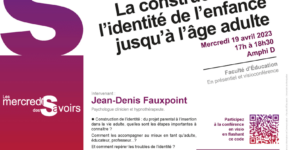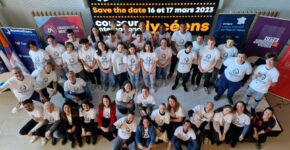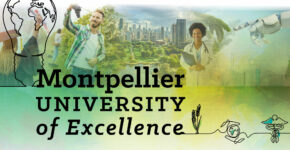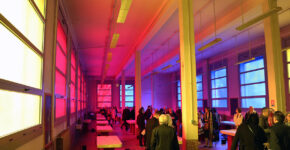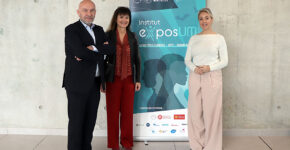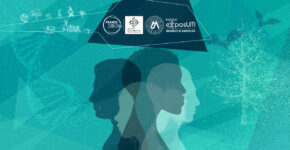Content type: Page
L’Université de Montpellier réunit près de 5100 personnels dont environ 3000 titulaires identifiés au sein de deux grandes familles de métiers : les personnels enseignants chercheurs et enseignants les personnels des bibliothèques, ingénieurs, administratifs, techniques, sociaux et de santé (BIATSS) En publiant sa charte pour le Recrutement Ouvert, Transparent et basé sur le Mérite (OTM-R) dans le cadre du label européen “HR Excellence in Research”, l’Université de Montpellier fait le choix de rendre compte de cette démarche et des processus de recrutement en vigueur au sein de l’UM à l’égard des chercheurs et chercheuses et de l’ensemble des personnels de l’établissement. Recrutement A l’Université de Montpellier
L’université recrute des personnels enseignants-chercheurs et enseignants, chercheurs, administratifs, techniques, des bibliothèques, sociaux et de santé ainsi que des emplois étudiants et volontaires en service civique. Pour toute information générale sur le recrutement des personnels dans la fonction publique, consulter le site de la Fonction Publique : portail SCORE. Personnels enseignants-chercheurs et enseignants Consulter les recrutements de titulaires Consulter les recrutements de contractuels Personnels des bibliothèques, ingénieurs, administratifs, techniques, sociaux et de santé Consulter les recrutements de titulaires Consulter les recrutements de contractuels Emplois étudiants et volontaires en service civique Consulter les offres Au sein des établissements partenaires Formation des personnels L’offre collective de formation
L’offre collective de formation s’adresse aux personnels titulaires et contractuels BIATSS, Enseignants-Chercheurs , Enseignants et Chercheurs de l’Université. Les inscriptions se font sur la plateforme GEFORP (GEstion des FORmations pour les Personnels). Offre de formation des personnels 1e sem. 2026Télécharger Consulter les programmes, les dates des sessions du second semestre et s’inscrire sur GEFORP (onglet « mon dossier » de l’ENT). Vous pourrez également suivre l’avancement de vos demandes d’inscription, visualiser la validation en ligne de votre supérieur hiérarchique, être alerté de la programmation de nouvelles sessions, éditer une attestation de formation… Développer ses compétences à distance et en continu
Le bureau de la gestion et du développement des compétences met à votre disposition un ensemble de ressources gratuites (MOOC, tutoriels, webinaires etc.), disponibles en ligne et consultables à distance. Les ressources sont classées par domaine. Application de gestion Pour obtenir des informations ou de la documentation sur : APOGEE : consulter la documentation de formation (PPS et vidéos) dans l’espace Moodle en demandant l’accès via le Centre de Services, domaine Etudes, catégorie APOGEE. PSTAGE : contacter le correspondant Pstage de votre composante ou à défaut déposer un ticket via le Centre de Services, domaine Etudes, catégorie PSTAGE AMETYS : contacter le correspondant Ametys de votre composante ou à défaut déposer un ticket via le Centre de Services, domaine Etudes, catégorie AMETYS ECANDIDAT : consulter les documents d’accompagnement à la gestion des candidatures et à l’utilisation d’eCandidat dans l’intranet DFE : Documentation candidatures contacter le correspondant Ecandidat de votre composante ou à défaut déposer un ticket via le Centre de Services, domaine Etudes, catégorie ECANDIDAT SOFA : déposer un ticket via le Centre de Services, domaine Etudes, catégorie SOFA PROSE : contacter le référent Prose de votre composante ou à défaut déposer un ticket via le Centre de Services, domaine Etudes, catégorie PROSE SIFAC : consulter la documentation dans l’intranet DAF : formations métiers et outils ou déposer un ticket via le Centre de Services, domaine Finances ou Achats selon le type de demande. Outils bureautiques, numériques et collaboratifs Réalisez des documents texte Maîtrisez les fondamentaux d’Excel Perfectionnez-vous sur Excel Réalisez un diaporama pour accompagner votre présentation Messagerie ZIMBRA documentation et tutoriels disponibles sur l’ENT Microsoft 365 / Teams : la DSIN propose un ensemble de tutoriels et guides sur ces outils collaboratifs Le Service des Usages du Numérique (SUN) de la DSIN vous propose : un ensemble de tutoriels autour de l’enseignement numérique et Moodle des webinaires sur ces thématiques et leur replay des formations à la demande sur les sujets d’enseignement numérique (ex: hybridation des cours), Moodle… Vous pouvez adresser votre besoin par [courriel | rf.re1771979354illep1771979354tnomu1771979354@eigo1771979354gadep1771979354-nus-1771979354nisd1771979354]. ainsi que des tutoriels et guides sur les outils de visioconférence, webconférence, webinaire, classe virtuelle : Zoom, Teams, Renavisio, Rendez vous, Big Blue Button etc. pour toute autre information : https://numerique.umontpellier.fr/ Microsoft 365 / Teams : la DSIN propose un ensemble de tutoriels et guides sur ces outils collaboratifs Autres formations gratuites en ligne / MOOC et tutoriels : Apprendre à coder avec Python Python 3 : des fondamentaux aux concepts avancés du langage Et bien d’autres sur le site FUN-MOOC, en recherchant le thème « informatique » Enseignement et recherche Le Service des Usages du Numérique (SUN) de la DSIN vous propose également : un ensemble de tutoriels autour de l’enseignement numérique et Moodle des webinaires sur ces thématiques et leur replay des formations à la demande sur les sujets d’enseignement numérique (ex: hybridation des cours), Moodle… Vous pouvez adresser votre besoin par [courriel | rf.re1771979354illep1771979354tnomu1771979354@eigo1771979354gadep1771979354-nus-1771979354nisd1771979354]. ainsi que des tutoriels et guides sur les outils de visioconférence, webconférence, webinaire, classe virtuelle : Zoom, Teams, Renavisio, Rendez vous, Big Blue Button etc. pour toute autre information : https://numerique.umontpellier.fr/ Le Centre de Soutien aux Innovations Pédagogiques (CSIP) offre des formations / ateliers en lien avec les pédagogies actives. Autres formations gratuites en ligne / MOOC et tutoriels : Se former pour enseigner dans le supérieur La formation par apprentissage dans l’enseignement supérieur (développé par le CFA ENSUP LR) Etudiants dyslexiques dans mon amphi : comprendre et aider Intégrité scientifique dans les métiers de la recherche Et bien d’autres sur le site FUN-MOOC, en recherchant les thèmes « education et formation » et « outils méthodes et enjeux de la recherche » Plateforme Néopass Sup (Institut Français de l’Education) Santé et sécurité Replay de la formation « Posture devant un écran » disponible sur la plateforme vidéo de l’Université Sensibilisation aux gestes de premiers secours : Site « Everyday hero » développé avec la brigade de sapeurs-pompiers de Paris (initiation au secourisme à travers une centaine de mises en situation : malaise, arrêt cardiaque, étouffement, brûlure,…) MOOC « sauvTage » : apprendre à sauver une vie à tous les âges Langues Anglais facile Anglais : Thèmes d’actualité à écouter pour tous les niveaux Anglais : Cours d’anglais proposés par la BBC ( « 6 minutes english », avec différents niveaux possibles) Site FUN-MOOC, en recherchant le thème « langues » Management Webinaires (conférences en ligne) à voir en replay : Webinaire DGAFP sur les bonnes pratiques du management à distance Autres formations gratuites en ligne / MOOC et tutoriels : Sur le site FUN MOOC, en recherchant le thème « management » Guides / fiches pratiques : Guides DGAFP : Guide de l’encadrant dans la fonction publique (incluant un chapitre « manager à distance ») Télétravail et travail en présentiel (vol 1): Quelques repères pour adapter vos pratiques aux modes de travail mixtes Télétravail et travail en présentiel (vol 2): Des idées pour discuter en équipe de nos modes de fonctionnement Guide PARFAIRE : « Le rapport d’aptitude- dossiers de promotion ITRF” (à destination des N+1) : Télécharger la version PDF ou consulter la version dynamique en ligne. Formations métiers – environnement professionnel Webinaires (conférences en ligne) sur le télétravail à voir en replay : Webinaire PFRH « Agents, bien vivre le télétravail » (décembre 2020) Webinaire PFRH « Trucs et astuces pour un télétravail réussi » (mai 2020) Autres formations gratuites en ligne / MOOC et tutoriels : Initiation au RGPD Gérez votre temps efficacement Prise de parole en public Grammaire élémentaire de la langue française J’améliore mon français écrit Et bien d’autres sur le Site FUN-MOOC Guides / fiches pratiques : Guide PARFAIRE : « Structure et fonctionnement des établissements d’enseignement supérieur »: Télécharger la version PDF ou consulter la version dynamique en ligne Guides DGAFP sur le télétravail – travail à distance : Télétravail et travail en présentiel (vol 1) : Quelques repères pour adapter vos pratiques aux modes de travail mixtes Télétravail et travail en présentiel (vol 2) : Des idées pour discuter en équipe de nos modes de fonctionnement Fiches UM / DRH disponibles sur l’intranet : Fiches pratiques : « Le travail à distance en période de confinement » Transition écologique Le numérique responsable Sensibilisation au numérique responsable Agir pour un numérique responsable Site FUN-MOOC , en recherchant le thème « développement durable » Site de l’UVED (Université Virtuelle Environnement et Développement Durable) Responsabilité sociétale Voir le plan d’action relatif à l’égalité professionnelle Femmes-Hommes 2023 - 2025 de l’université Handicap et accessibilité numérique Sensibilisation au handicap au travail « AccessiPro » Mise en œuvre de l’accessibilité numérique pour les personnes en situation de handicap (formation à destination des chefs de projets numériques) Formation aux aides techniques numériques « Ordi Facile » Préparation aux concours ITRF / épreuves de promouvabilité Concours ITRF Pour toute information relative aux différents types de concours (conditions d’éligibilité, types d’épreuves…), nous vous invitons à consulter le site du ministère (MESRI). Le bureau du recrutement de la DRH de l’Université est également à votre disposition pour répondre à vos questions par [courriel | rf.re1771979354illep1771979354tnomu1771979354@frti1771979354-sruo1771979354cnoc-1771979354hrd1771979354]. Concours AENES Pour toute information relative aux différents types de concours (conditions d’éligibilité, types d’épreuves…), nous vous invitons à consulter le site du ministère (MEN) L'Ecole académique de la formation continue (EAFC) propose notamment des formations de préparation aux concours de l’AENES. Les formations proposées sont ouvertes aux personnels de l’université et font l’objet d’une campagne d’inscription annuelle (juin-septembre), relayée par le bureau de la gestion et du développement des compétences. Ressources en ligne : L’emploi dans la fonction publique, comment ça marche ? Guides Parfaire (guides d’aide à la préparation des concours ITRF et de connaissance du fonctionnement des établissements d’enseignement supérieur) Grammaire élémentaire de la langue française J’améliore mon français écrit Les autres dispositifs de formation des personnels (hors offre) En savoir + Qualité de vie au travail L’Université de Montpellier place la Qualité de Vie au Travail (QVT) au cœur de ses engagements. L’établissement déploie une politique active et met en œuvre un plan d’actions annuel, qui s’inscrit dans la continuité des travaux menés depuis plusieurs années par le comité de pilotage des risques psychosociaux. Cette démarche s’inscrit dans la volonté d’engager l’université autour d’une série de mesures concrètes, visant à développer des actions favorisant le bien-être et l’épanouissement professionnel et à renforcer la prévention des situations de mal-être au travail. Un accompagnement dédié pour les personnels L’UM est dotée d’un réseau de professionnels (psychologues, coach des personnels, conseillères en parcours professionnel…) qui peuvent accompagner les agents dans leur vie professionnelle. Ils peuvent également aider en cas de difficultés ou de souffrance au travail et répondre à toutes les questions liées à la sécurité ou au mal être. Ils reçoivent en toute confidentialité. Les personnels qui souhaitent en savoir plus ou connaître les bons contacts peuvent consulter la plaquette Mieux vivre au travail disponible sur intranet. Des actions concrètes tout au long de l’année Le service qualité de vie au travail de la direction Vie des Campus met en place des initiatives à l’Université pour améliorer les conditions de travail et renforcer le bien-être collectif. Prévention et accompagnement
Des dispositifs sont accessibles pour écouter, orienter et accompagner les agents et agentes confrontés à des difficultés professionnelles ou personnelles, et prévenir les risques liés à la santé mentale au travail : Dispositifs d’écoute et de soutien individuel, Accompagnement en cas de difficultés au travail. Pour en savoir plus, les personnels de l’UM peuvent consulter l’article intranet dédié en cliquant ici. Bien-être au travail
Des ateliers gratuits sont proposés tout au long de l’année pour favoriser le bien-être et la qualité de vie au travail : Gestion du stress, massages, relaxation, sophrologie, Qi Gong, Prise de parole en public, développement de la confiance en soi. Toutes les informations (dates, horaires, lieux) sont communiquées régulièrement par mail aux personnels. Semaine de la QVT et autres semaines thématiques
Tout au long de l’année, le service qualité de vie au travail[v1] propose au personnel de l’UM des rendez-vous sous forme de conférences, d’ateliers et de temps d’échanges autour de thématiques variées liées au bien-être au travail mais également à l’inclusion, la diversité et l’égalité. En juin, la Semaine de la Qualité de Vie au Travail est un moment privilégié pour sensibiliser, informer et valoriser les démarches engagées en faveur de la QVT. En savoir +
